#admiral edward pellew
Explore tagged Tumblr posts
Text
I am reading a biography about Edward Pellew (Commander by Stephen Taylor) and what can I say: He's was so amazing!

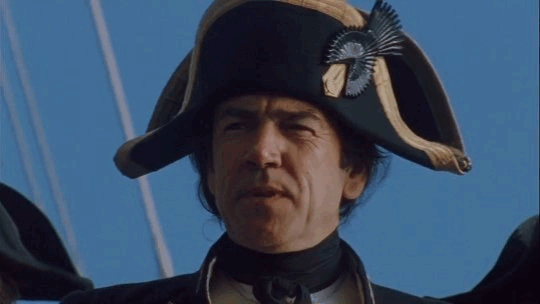

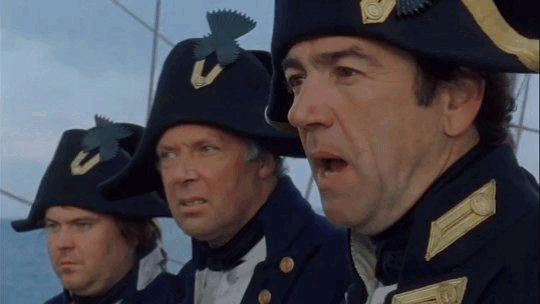


#edward pellew#admiral edward pellew#captain#naval officer#royal navy#robert lindsay#hornblower#hornblower series#biography#history
26 notes
·
View notes
Text

Do I disobey my order? Or do I stay here and wait for the dead to return?
Captain Edward Pellew
declaring this finished. i've been staring at it for far too long.
[ reblog? yes please! repost? no thanks! | commissions are open! | or buy me a coffee? ]
#hornblower#edward pellew#captain pellew#captain edward pellew#commodore pellew#admiral pellew#ilu daddy man 🩷#procreate#digital art#mine#my art#digital portrait#art#full colour painting
201 notes
·
View notes
Text
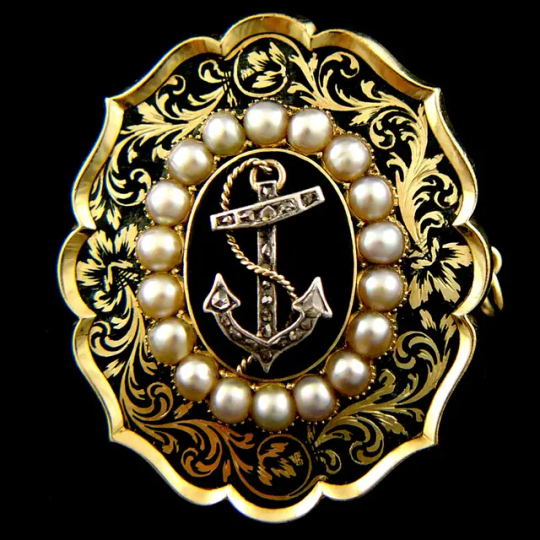
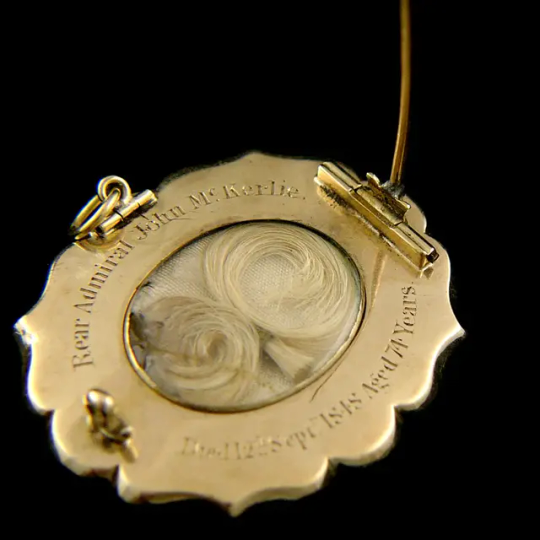
Memorial Brooch to Rear Admiral McKerlie, Died 12th Septr 1848. Aged 74 years, 1848
Rear Admiral John McKerlie (1774-1848) entered the Royal Navy as a volunteer in April 1794 having been at sea in the Atlantic and Baltic merchant service from a young age. Rated Able Seaman, he was sent from the receiving ship Royal William to join the elite frigate force based at Falmouth that cruised the Channel countering the activities of French commerce raiders. McKerlie was assigned to the frigate Arethusa (38) commanded by one of the most successful frigate captains of the day, Captain Sir Edward Pellew.
In early 1795 McKerlie followed Pellew into the 44-gun heavy frigate Indefatigable with the rate of Quarter-Gunner. Owing to a sound Scottish education and his knowledge of the sea McKerlie was soon acting as Indefatigable’s schoolmaster instructing the other eighteen ‘young gentleman’ of the gunroom in the specifics of their profession, having himself been appointed a midshipman. Throughout 1795 and 1796 he participated in the capture of the numerous French prizes which brought further fame and glory to Sir Edward Pellew. It was however early the next year that Indefatigable fought what is generally regarded as one of the boldest frigate actions of the French Revolutionary War.
On the dark and stormy night of 13 January 1797 the French 74 Droits de l’Homme was sighted off the Brittany coast. Pellew, recognizing that he was heavily outclassed, saw that the waves prevented his opponent from opening the lower gun ports and that the severe weather had caused the loss of the enemy’s topmasts. Seizing the initiative, Indefatigable closed followed by the frigate Amazon and raked the French ship of the line at every opportunity. The enemy replied with 4,000 canon balls over the next few hours until finally driven in to Audierne Bay irreparably damaged by British gunfire and the unabated gale. The sight of distant breakers however threatened the destruction of all three ships. Indefatigable, though with masts damaged and with four feet of water in her hold, alone just had time to alter course and escape.
For Pellew the action was a triumph, Lord Spencer at the Admiralty acknowledging that for two frigates to destroy a ship of the line was ‘an exploit which has not I believe ever before graced our naval Annals’. For McKerlie the action was a trauma, costing him his right arm and a severe wound to the thigh. McKerlie's sacrifice was deeply felt Sir Edward Pellew whom he followed to his subsequent command, the mutinous ship of the line Impetueux. While serving aboard the Impetueux, McKerlie participated in numerous boat actions during the Quiberon expedition in 1800, and was present during the planning of a proposed attack on Belleisle. Marshall’s Royal Naval Biography relates how McKerlie ‘…not having heard how he was to be employed, went up to Sir Edward, interrupted him in a conversation with Major-General Maitland, and asking what part he was to act in the event of a debarkation taking place? The answer was “McKerlie you have lost one hand already, and if you loose the other you will not have anything to wipe your backside with; you will remain on board with the first lieutenant and fight the ship as she is to engage an 8-gun battery.”’
The loss of an arm did little to impede McKerlie’s career. He was regarded as a talented surveyor and draftsman, working at onetime with the celebrated civil engineer Thomas Telford. He was also considered a first class shot. He received his lieutenant’s commission in 1804 and served in H.M.S. Spartiate at the Battle of Trafalgar on 21 October 1805. He was present in the capture of Flushing and the Walcheren expedition, and commanded a squadron of ships stationed off Heligoland; oversaw the defence and retreat from Cuxhaven; and was responsible for destroying enemy shipping on the Braak.
Unable to get a command after 1813, McKerlie returned to his native Galloway where he married, Harriet, daughter of James Stewart of Cairnsmuir, had one daughter, Lillias (1821-1915), to either or both of whom the present brooch no doubt belonged. In a post service career McKerlie served as a local magistrate and operated commercial vessels from the port of Garlieston. After almost twenty years ashore, he made an unlikely returned to the Royal Navy as captain of the experimental frigate Vernon between 1834 and 1837. He was awarded a Pension for Wounds on 8 May 1816.
Despite the ever growing kudos that was accorded to Trafalgar veterans in the early Victorian age, it is perhaps with greater pride that Admiral McKerlie recalled his service under Pellew (or Lord Exmouth, as he became); and in 1847 was one of only eight surviving veterans who had lived long enough to apply for the Naval General Service Medal with a clasp for the Droits de L’Homme engagement. The following year, in 1848, he died at Corvisel House, Newton Stewart, at the age of seventy-three.
#naval history#naval artifacts#memorial brooch#18th century#19th century#age of sail#rear admiral mckerlie#trafalgar veteran
181 notes
·
View notes
Text

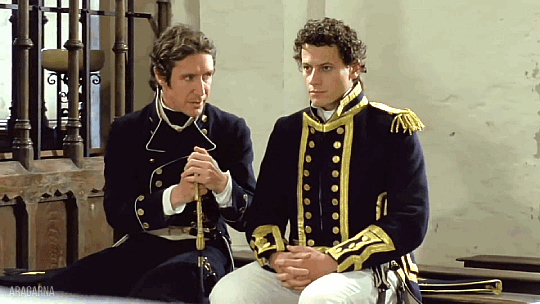
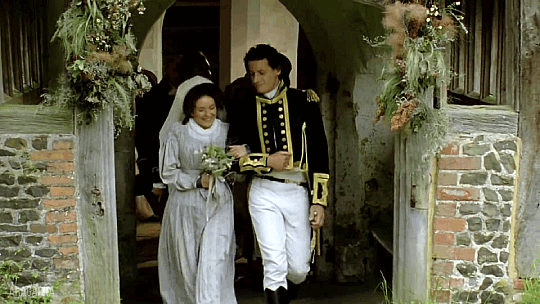
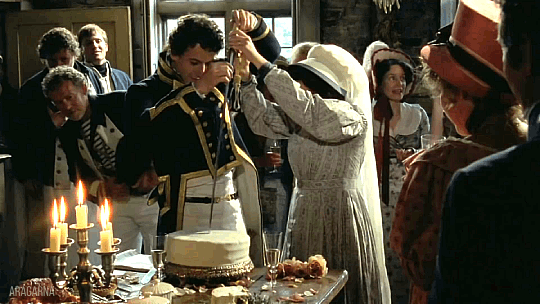
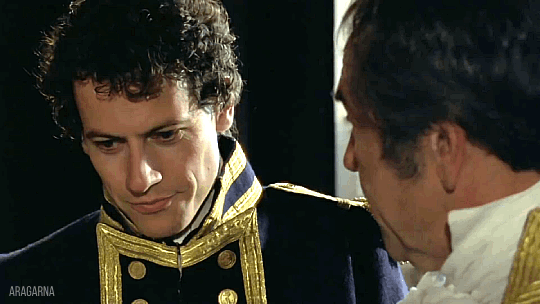
Requested by @lulu-cat-princess: Ioan Gruffudd as Captain Horatio Hornblower in his wedding uniform (Hornblower, 3x01) - feat. Julia Sawalha as Maria Hornblower, Paul McGann as William Bush and Robert Lindsay as Admiral Edward Pellew
#ioan gruffudd#horatio hornblower#hornblower#paul mcgann#william bush#maria#julia sawalha#robert lindsay#edward pellew#my gifs
137 notes
·
View notes
Text
Friends, enemies, comrades, Jacobins, Monarchist, Bonapartists, gather round. We have an important announcement:
The continent is beset with war. A tenacious general from Corsica has ignited conflict from Madrid to Moscow and made ancient dynasties tremble. Depending on your particular political leanings, this is either the triumph of a great man out of the chaos of The Terror, a betrayal of the values of the French Revolution, or the rule of the greatest upstart tyrant since Caesar.
But, our grand tournament is here to ask the most important question: Now that the flower of European nobility is arrayed on the battlefield in the sexiest uniforms that European history has yet produced (or indeed, may ever produce), who is the most fuckable?
The bracket is here: full bracket and just quadrant I
Want to nominate someone from the Western Hemisphere who was involved in the ever so sexy dismantling of the Spanish empire? (or the Portuguese or French American colonies as well) You can do it here
The People have created this list of nominees:
France:
Jean Lannes
Josephine de Beauharnais
Thérésa Tallien
Jean-Andoche Junot
Joseph Fouché
Charles Maurice de Talleyrand
Joachim Murat
Michel Ney
Jean-Baptiste Bernadotte (Charles XIV of Sweden)
Louis-Francois Lejeune
Pierre Jacques Étienne Cambrinne
Napoleon I
Marshal Louis-Gabriel Suchet
Jacques de Trobriand
Jean de dieu soult.
François-Étienne-Christophe Kellermann
17.Louis Davout
Pauline Bonaparte, Duchess of Guastalla
Eugène de Beauharnais
Jean-Baptiste Bessières
Antoine-Jean Gros
Jérôme Bonaparte
Andrea Masséna
Antoine Charles Louis de Lasalle
Germaine de Staël
Thomas-Alexandre Dumas
René de Traviere (The Purple Mask)
Claude Victor Perrin
Laurent de Gouvion Saint-Cyr
François Joseph Lefebvre
Major Andre Cotard (Hornblower Series)
Edouard Mortier
Hippolyte Charles
Nicolas Charles Oudinot
Emmanuel de Grouchy
Pierre-Charles Villeneuve
Géraud Duroc
Georges Pontmercy (Les Mis)
Auguste Frédéric Louis Viesse de Marmont
Juliette Récamier
Bon-Adrien Jeannot de Moncey
Louis-Alexandre Berthier
Étienne Jacques-Joseph-Alexandre Macdonald
Jean-Mathieu-Philibert Sérurier
Catherine Dominique de Pérignon
Guillaume Marie-Anne Brune
Jean-Baptiste Jourdan
Charles-Pierre Augereau
Auguste François-Marie de Colbert-Chabanais
England:
Richard Sharpe (The Sharpe Series)
Tom Pullings (Master and Commander)
Arthur Wellesley, 1st Duke of Wellington
Jonathan Strange (Jonathan Strange & Mr. Norrell)
Captain Jack Aubrey (Aubrey/Maturin books)
Horatio Hornblower (the Hornblower Books)
William Laurence (The Temeraire Series)
Henry Paget, 1st Marquess of Anglesey
Beau Brummell
Emma, Lady Hamilton
Benjamin Bathurst
Horatio Nelson
Admiral Edward Pellew
Sir Philip Bowes Vere Broke
Sidney Smith
Percy Smythe, 6th Viscount Strangford
George IV
Capt. Anthony Trumbull (The Pride and the Passion)
Barbara Childe (An Infamous Army)
Doctor Maturin (Aubrey/Maturin books)
William Pitt the Younger
Robert Stewart, 2nd Marquess of Londonderry (Lord Castlereagh)
George Canning
Scotland:
Thomas Cochrane
Colquhoun Grant
Ireland:
Arthur O'Connor
Thomas Russell
Robert Emmet
Austria:
Klemens von Metternich
Friedrich Bianchi, Duke of Casalanza
Franz I/II
Archduke Karl
Marie Louise
Franz Grillparzer
Wilhelmine von Biron
Poland:
Wincenty Krasiński
Józef Antoni Poniatowski
Józef Zajączek
Maria Walewska
Władysław Franciszek Jabłonowski
Adam Jerzy Czartoryski
Antoni Amilkar Kosiński
Zofia Czartoryska-Zamoyska
Stanislaw Kurcyusz
Russia:
Alexander I Pavlovich
Alexander Andreevich Durov
Prince Andrei (War and Peace)
Pyotr Bagration
Mikhail Miloradovich
Levin August von Bennigsen
Pavel Stroganov
Empress Elizabeth Alexeievna
Karl Wilhelm von Toll
Dmitri Kuruta
Alexander Alexeevich Tuchkov
Barclay de Tolly
Fyodor Grigorevich Gogel
Ekaterina Pavlovna Bagration
Ippolit Kuragin (War and Peace)
Prussia:
Louise von Mecklenburg-Strelitz
Gebard von Blücher
Carl von Clausewitz
Frederick William III
Gerhard von Scharnhorst
Louis Ferdinand of Prussia
Friederike of Mecklenburg-Strelitz
Alexander von Humboldt
Dorothea von Biron
The Netherlands:
Ida St Elme
Wiliam, Prince of Orange
The Papal States:
Pius VII
Portugal:
João Severiano Maciel da Costa
Spain:
Juan Martín Díez
José de Palafox
Inês Bilbatua (Goya's Ghosts)
Haiti:
Alexandre Pétion
Sardinia:
Vittorio Emanuele I
Lombardy:
Alessandro Manzoni
Denmark:
Frederik VI
Sweden:
Gustav IV Adolph
62 notes
·
View notes
Text

welcome to ROUND 1 of the MARITIME MATCHUPS!
Round 1 Masterpost:
Nigel and Chauncey Badminton vs Peter Calamy
Henry Noble vs Hiram Nightingale
Horatio Nelson (As Portrayed by Jim Howick) vs Sir John Franklin
Midshipman Longley vs William Blakeney
Barrett Bonden vs the Dark-Spectacled Admiral
Francis Crozier vs James Barnes
Chadwick Goodfellow vs Marmaduke Bonthrop Shelmerdine
Arthur Courtney vs Midshipman Hollom
Alexander MacIntosh vs Frank Mildmay
Captain Chase vs Roger Byam
William Mowett vs Sir Edward Pellew
William Bush vs Thomas Pullings
William Laurence vs James Norrington
Archie Kennedy vs Frederick Wentworth
#maritime matchups#round 1#welcome back to the torment nexus my esteemed guests. it's already tormentous!
34 notes
·
View notes
Text
Joseph Antonio Emidy and The Music We Lost
"This remarkable man was the most finished musician I ever heard of, though I have had the privilege of listening to most of the stars who have appeared on the London stage during the past fifty years, but not one of them in my estimation has equalled this unknown negro." -William R. Tuck on Joseph Emidy
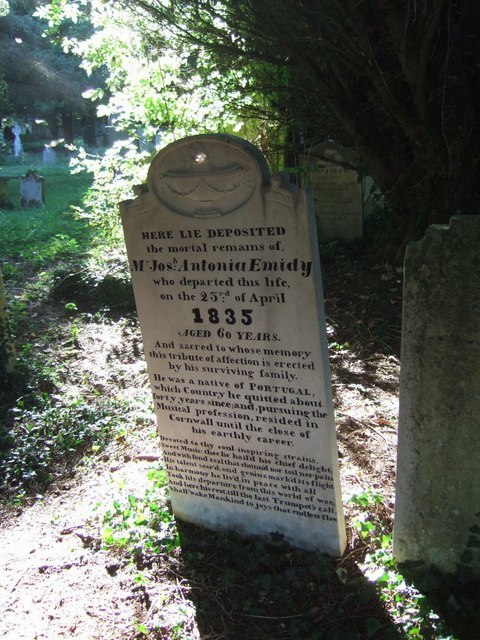
Read on after the cut:
Born somewhere around the year 1775 in Guinea and sold to Portuguese slavers as a child, Joseph was first taken to Brazil and then to Lisbon, Portugal. His owner recognized his musical talents and sought to cultivate them by providing Joseph with violin lessons from a professional musician. In a short three or four years, he was proficient enough to be playing in the second violin section of the pit orchestra for the Lisbon Opera. As someone who plays violin, I have to point out that violin has one of the toughest technical learning curves for a beginner, and to be playing professionally after only four years of serious lessons is impressive AF. He was still enslaved at this time, a fundamentally unjust situation to be in, but it seems at the least that he was allowed to flourish musically.
Enter Sir Edward Pellew, captain of the HMS Indefatigable. At the outset of the French Revolutionary Wars, the Indefatigable met up with the Tagus in the port of Lisbon and the officers went ashore to attend the opera before sailing into the Mediterranean. While there, Emidy seems to have caught Pellew's eye, perhaps because he may have been the only black violinist in the second violin section.
Pellew was aware that fighting the French was going to be a years-long campaign, and that his men would be badly in need of something to help bolster their morale along the way. Thus, by the end of the concert he had directed his men to press-gang Emidy as he left the theater to ensure that they would have a good fiddler to entertain them on ship during the war.
So when you hear about crews kidnapping musicians just so they could have entertainment on board this is the chief canonical example of just that. And as much as Admiral Pellew is admired for his bravery and cunning throughout his career, I can't help but see the flip side of that same mindset, the part that was okay with casually kidnapping someone from an orchestra on the coldly calculated basis that he would be the least likely to be missed.
For approximately four years Emidy served in the Royal Navy as the crew's chief source of onboard entertainment, playing the fiddle for them so they could dance in the evenings. He was not allowed shore leave from the HMS Indefatigable during the entirety of that time, because he was openly miserable about his situation and they feared he would abscond at the first opportunity. Who can blame him? At last, in 1799 Pellew received a commission for the Impetueux. Seeing that he couldn't keep his fiddler much longer, he discharged Emidy at the docks of his home base in Falmouth, Cornwall.
Emidy became an integral part of Cornwall's music circuit, performing regularly at concerts, theatres, and assemblies in various parts of the county, in addition to giving music lessons. He wrote numerous compositions which were held in high enough regard locally that a young James Silk Buckingham (who had taken music lessons with Emidy) was moved to travel to London in 1807 to present some of them to composer and impresario Johann Peter Salomon and his circle of music professionals. While Salomon was intrigued enough to offer Emidy a chance to come perform in London, others warned that even with his talent he would face an uphill battle against the racial prejudices of Londoners. In Cornwall, they argued, at least he was already well-known and well-liked. Ultimately, he remained in Cornwall.
This London meeting happened at about the same time that violin virtuoso George Bridgetower was elected to the Royal Society of Musicians and began working towards his bachelor's in music at Trinity Hall, Cambridge. Perhaps Bridgetower was given more of a pass by London society because he was mulatto, and because of his (somewhat alleged) noble lineage. Emidy was wholly of African descent and a former slave. His abilities had the potential to pose uncomfortable questions to an English society newly grappling with the issue of abolition (the first Abolition Act, which banned the direct purchase of enslaved people from Africa, was passed right in 1807). If nothing else, this experience made an impression on Buckingham, who went on to become an ardent abolitionist and social reformer. On Emidy, Buckingham wrote, "With the same advantages as were enjoyed by most of the great composers of Europe, this man might have become a Mendelssohn or Beethoven; but as it was, it was the achievement of extraordinary perfection, in spite of a thousand obstacles or difficulties."
Emidy lived the rest of his life in Cornwall, making his round of gigs, teaching, and composing. He married Jenefer Hutchins in 1802 and the couple went on to have at least six children (some sources say eight). He died in 1835 at the approximate age of 60, and is buried in Kenwyn Parish Church in Truro.
Several different sources attest to a variety of compositions that Emidy wrote over the course of his career, including chamber music, symphonies, a horn concerto, and several pieces for violin. None of these pieces have been found, at least not yet. It's not so unusual for the time to have no trace of a composer's works, as there was no concerted effort to preserve music that was going out of fashion (and musical tastes changed quite rapidly during this period). But it is extremely disappointing that someone didn't hold onto this music, especially since it seems to have garnered some high praise.
9 notes
·
View notes
Text
An excellent guide, and a great addition as well.
If you are reluctant to name your characters in a 'Regency' (or any other historical setting with a much narrower distribution of common first names as today) the top 3 names for that era and have several characters with the same first name for 'authenticity' reasons, fret not. It's a valid concern; having delved into the history of an Anglo-Irish family of predominantly naval officers of the 18th and 19th centuries, people did get confused even then. With up to 4 family members of the same name (given- and surname) alive at the same time, distinctions got tricky, quickly, especially among the rather uniformely named men, who were either Johns, Samuels, Thomases or Richards. References to their ranks (i. e. calling the eldest Mrs Samuel Graves "Mrs Admiral" to set her apart from the other Mrs (Samuel) Graveses) and shortened nicknames were used within the family, but the confusion was not limitted to the family and severe enough that even the Earl of Sandwich, the First Lord of the Admiralty, occasionally got the half dozen or so Graveses under his command confused in his letters.
In order to avoid a family constellation like that for your characters, or simply because you might just like to give them a more 'unique' name, here are some more or less unusual names compiled from my own research, mostly covering people born into upper- or upper middle class families in the anglophone sphere of the latter half of the 18th century that could serve as some inspiration for how to make up a 'Regency' (given) name that is recognisable, yet retains a period-appropriate ring to it.
Needless to say, you can do some digging and learn about common and less common names at other points in time or of other geographical settings as well, but since OP's post was about Regency names and the popular genre of Regency fiction (as a descriptor in fiction, the term Regency usually refers to Britain, usually England from 1800 to the 1820s), I have left out any later or earlier remarkable names I have collected over time.
Mum and Dad are Pretentious Reading Americus in the H-tier list, my first thought was of Friedrich Adolf von Riedesel, a Hessian commander in the American Revolutionary War. His wife Friederike Charlotte accompanied him, and fell pregnant while in North America. Hoping for a boy, they decided on the name "Americus", intending to name their son for his birth place. When the baby turned out to be a daughter, the little one was swiftly dubbed "Amerika". Amerika von Bernstorff, née Riedesel (b. 1780) married and had children with somewhat more ordinary names. In the same category fall the siblings Septima Sexta, Seraphima, Olivia Septima and last but not least, Octavia Isabella Colleton Graves (b. 1790, 1794, 1799 and 1805 respectively), although "Olivia" was a family heirloom name that had first belonged to a great-aunt born in 1695. Curiously, their other 6 siblings had comparatively more common given names. For some added confusion for the casual Latin enjoyers, Septima Sexta was the 7th child, Olivia Septima the 8th, and Octavia Isabella the 10th, albeit the 8th daughter.
(Middle) Name Is a Godparent's Surname: Similar to naming a boy for his mother's maiden name. Leaves you ample opportunity to fairly credibly introduce an amusing or broodily ominous talking name. My favourite will probably forever be John Graves Simcoe (b. 1752), of whom it is known that the first 'dates' he and his wife had were outings to the ruins of a medieval abbey. You couldn't make it up more gothically romantic. John Graves also loved writing poems heavy with urn symbolism. He managed to rhyme "urn" with "shall my Eliza with true passion burn." I wish I were joking. A more unfortunate example would be Pownoll Bastard Pellew (b. 1786), son of the famous Sir Edward Pellew, and perhaps one to have lived up to his middle name if one looks at his biography. Named in honour of the man whom his father felt he owed his career to, the illustriously-named Captain Philemon Pownoll, who had died in a battle that had ultimately sparked the future Sir Edward's career, and the locally powerful Bastard family from Devon (stress is on the second syllable, not the first, obviously), now this is a name one couldn't possibly come up with naming a dastardly villain character.
(Middle) Name Posthumus/Posthuma for a Posthumous Child: rare, but did happen to mark the death of a parent prior to a child's birth. The wife of the aforementioned urn-enthusiast John Graves Simcoe was born Elizabeth Posthuma Gwillim (b. 1762), having lost her father when her mother was a mere month pregnant, who then in turn died shortly after birth. Elizabeth only appears to have used her middle name in legal contexts, indicating she did not like it very much, perhaps because in a way, it made her into a living memorial to two people she had never known.
Named for a Parent, but It's Their Nickname: Little Eliza Simcoe (b. 1782) was named for her mother, Elizabeth Posthuma. Her father, John Graves picked "Eliza" because that was the special nickname he used for his wife. Very much in love and wanting to honour 'Eliza Senior', he proposed naming their firstborn after her mother.
A Guide to Historically Accurate Regency-Era Names

I recently received a message from a historical romance writer asking if I knew any good resources for finding historically accurate Regency-era names for their characters.
Not knowing any off the top of my head, I dug around online a bit and found there really isn’t much out there. The vast majority of search results were Buzzfeed-style listicles which range from accurate-adjacent to really, really, really bad.
I did find a few blog posts with fairly decent name lists, but noticed that even these have very little indication as to each name’s relative popularity as those statistical breakdowns really don't exist.
I began writing up a response with this information, but then I (being a research addict who was currently snowed in after a blizzard) thought hey - if there aren’t any good resources out there why not make one myself?
As I lacked any compiled data to work from, I had to do my own data wrangling on this project. Due to this fact, I limited the scope to what I thought would be the most useful for writers who focus on this era, namely - people of a marriageable age living in the wealthiest areas of London.
So with this in mind - I went through period records and compiled the names of 25,000 couples who were married in the City of Westminster (which includes Mayfair, St. James and Hyde Park) between 1804 to 1821.
So let’s see what all that data tells us…
To begin - I think it’s hard for us in the modern world with our wide and varied abundance of first names to conceive of just how POPULAR popular names of the past were.
If you were to take a modern sample of 25-year-old (born in 1998) American women, the most common name would be Emily with 1.35% of the total population. If you were to add the next four most popular names (Hannah, Samantha, Sarah and Ashley) these top five names would bring you to 5.5% of the total population. (source: Social Security Administration)
If you were to do the same survey in Regency London - the most common name would be Mary with 19.2% of the population. Add the next four most popular names (Elizabeth, Ann, Sarah and Jane) and with just 5 names you would have covered 62% of all women.
To hit 62% of the population in the modern survey it would take the top 400 names.
The top five Regency men’s names (John, William, Thomas, James and George) have nearly identical statistics as the women’s names.
I struggled for the better part of a week with how to present my findings, as a big list in alphabetical order really fails to get across the popularity factor and also isn’t the most tumblr-compatible format. And then my YouTube homepage recommended a random video of someone ranking all the books they’d read last year - and so I present…
The Regency Name Popularity Tier List
The Tiers
S+ - 10% of the population or greater. There is no modern equivalent to this level of popularity. 52% of the population had one of these 7 names.
S - 2-10%. There is still no modern equivalent to this level of popularity. Names in this percentage range in the past have included Mary and William in the 1880s and Jennifer in the late 1970s (topped out at 4%).
A - 1-2%. The top five modern names usually fall in this range. Kids with these names would probably include their last initial in class to avoid confusion. (1998 examples: Emily, Sarah, Ashley, Michael, Christopher, Brandon.)
B - .3-1%. Very common names. Would fall in the top 50 modern names. You would most likely know at least 1 person with these names. (1998 examples: Jessica, Megan, Allison, Justin, Ryan, Eric)
C - .17-.3%. Common names. Would fall in the modern top 100. You would probably know someone with these names, or at least know of them. (1998 examples: Chloe, Grace, Vanessa, Sean, Spencer, Seth)
D - .06-.17%. Less common names. In the modern top 250. You may not personally know someone with these names, but you’re aware of them. (1998 examples: Faith, Cassidy, Summer, Griffin, Dustin, Colby)
E - .02-.06%. Uncommon names. You’re aware these are names, but they are not common. Unusual enough they may be remarked upon. (1998 examples: Calista, Skye, Precious, Fabian, Justice, Lorenzo)
F - .01-.02%. Rare names. You may have heard of these names, but you probably don’t know anyone with one. Extremely unusual, and would likely be remarked upon. (1998 examples: Emerald, Lourdes, Serenity, Dario, Tavian, Adonis)
G - Very rare names. There are only a handful of people with these names in the entire country. You’ve never met anyone with this name.
H - Virtually non-existent. Names that theoretically could have existed in the Regency period (their original source pre-dates the early 19th century) but I found fewer than five (and often no) period examples of them being used in Regency England. (Example names taken from romance novels and online Regency name lists.)
Just to once again reinforce how POPULAR popular names were before we get to the tier lists - statistically, in a ballroom of 100 people in Regency London: 80 would have names from tiers S+/S. An additional 15 people would have names from tiers A/B and C. 4 of the remaining 5 would have names from D/E. Only one would have a name from below tier E.
Women's Names
S+ Mary, Elizabeth, Ann, Sarah
S - Jane, Mary Ann+, Hannah, Susannah, Margaret, Catherine, Martha, Charlotte, Maria
A - Frances, Harriet, Sophia, Eleanor, Rebecca
B - Alice, Amelia, Bridget~, Caroline, Eliza, Esther, Isabella, Louisa, Lucy, Lydia, Phoebe, Rachel, Susan
C - Ellen, Fanny*, Grace, Henrietta, Hester, Jemima, Matilda, Priscilla
D - Abigail, Agnes, Amy, Augusta, Barbara, Betsy*, Betty*, Cecilia, Christiana, Clarissa, Deborah, Diana, Dinah, Dorothy, Emily, Emma, Georgiana, Helen, Janet^, Joanna, Johanna, Judith, Julia, Kezia, Kitty*, Letitia, Nancy*, Ruth, Winifred>
E - Arabella, Celia, Charity, Clara, Cordelia, Dorcas, Eve, Georgina, Honor, Honora, Jennet^, Jessie*^, Joan, Joyce, Juliana, Juliet, Lavinia, Leah, Margery, Marian, Marianne, Marie, Mercy, Miriam, Naomi, Patience, Penelope, Philadelphia, Phillis, Prudence, Rhoda, Rosanna, Rose, Rosetta, Rosina, Sabina, Selina, Sylvia, Theodosia, Theresa
F - (selected) Alicia, Bethia, Euphemia, Frederica, Helena, Leonora, Mariana, Millicent, Mirah, Olivia, Philippa, Rosamund, Sybella, Tabitha, Temperance, Theophila, Thomasin, Tryphena, Ursula, Virtue, Wilhelmina
G - (selected) Adelaide, Alethia, Angelina, Cassandra, Cherry, Constance, Delilah, Dorinda, Drusilla, Eva, Happy, Jessica, Josephine, Laura, Minerva, Octavia, Parthenia, Theodora, Violet, Zipporah
H - Alberta, Alexandra, Amber, Ashley, Calliope, Calpurnia, Chloe, Cressida, Cynthia, Daisy, Daphne, Elaine, Eloise, Estella, Lilian, Lilias, Francesca, Gabriella, Genevieve, Gwendoline, Hermione, Hyacinth, Inez, Iris, Kathleen, Madeline, Maude, Melody, Portia, Seabright, Seraphina, Sienna, Verity
Men's Names
S+ John, William, Thomas
S - James, George, Joseph, Richard, Robert, Charles, Henry, Edward, Samuel
A - Benjamin, (Mother’s/Grandmother’s maiden name used as first name)#
B - Alexander^, Andrew, Daniel, David, Edmund, Francis, Frederick, Isaac, Matthew, Michael, Patrick~, Peter, Philip, Stephen, Timothy
C - Abraham, Anthony, Christopher, Hugh>, Jeremiah, Jonathan, Nathaniel, Walter
D - Adam, Arthur, Bartholomew, Cornelius, Dennis, Evan>, Jacob, Job, Josiah, Joshua, Lawrence, Lewis, Luke, Mark, Martin, Moses, Nicholas, Owen>, Paul, Ralph, Simon
E - Aaron, Alfred, Allen, Ambrose, Amos, Archibald, Augustin, Augustus, Barnard, Barney, Bernard, Bryan, Caleb, Christian, Clement, Colin, Duncan^, Ebenezer, Edwin, Emanuel, Felix, Gabriel, Gerard, Gilbert, Giles, Griffith, Harry*, Herbert, Humphrey, Israel, Jabez, Jesse, Joel, Jonas, Lancelot, Matthias, Maurice, Miles, Oliver, Rees, Reuben, Roger, Rowland, Solomon, Theophilus, Valentine, Zachariah
F - (selected) Abel, Barnabus, Benedict, Connor, Elijah, Ernest, Gideon, Godfrey, Gregory, Hector, Horace, Horatio, Isaiah, Jasper, Levi, Marmaduke, Noah, Percival, Shadrach, Vincent
G - (selected) Albion, Darius, Christmas, Cleophas, Enoch, Ethelbert, Gavin, Griffin, Hercules, Hugo, Innocent, Justin, Maximilian, Methuselah, Peregrine, Phineas, Roland, Sebastian, Sylvester, Theodore, Titus, Zephaniah
H - Albinus, Americus, Cassian, Dominic, Eric, Milo, Rollo, Trevor, Tristan, Waldo, Xavier
& Men were sometimes given a family surname (most often their mother's or grandmother's maiden name) as their first name - the most famous example of this being Fitzwilliam Darcy. If you were to combine all surname-based first names as a single 'name' this is where the practice would rank.
*Rank as a given name, not a nickname
+If you count Mary Ann as a separate name from Mary - Mary would remain in S+ even without the Mary Anns included
~Primarily used by people of Irish descent
^Primarily used by people of Scottish descent
>Primarily used by people of Welsh descent
I was going to continue on and write about why Regency-era first names were so uniform, discuss historically accurate surnames, nicknames, and include a little guide to finding 'unique' names that are still historically accurate - but this post is already very, very long, so that will have to wait for a later date.
If anyone has any questions/comments/clarifications in the meantime feel free to message me.
Methodology notes: All data is from marriage records covering six parishes in the City of Westminster between 1804 and 1821. The total sample size was 50,950 individuals.
I chose marriage records rather than births/baptisms as I wanted to focus on individuals who were adults during the Regency era rather than newborns. I think many people make the mistake when researching historical names by using baby name data for the year their story takes place rather than 20 to 30 years prior, and I wanted to avoid that. If you are writing a story that takes place in 1930 you don’t want to research the top names for 1930, you need to be looking at 1910 or earlier if you are naming adult characters.
I combined (for my own sanity) names that are pronounced identically but have minor spelling differences: i.e. the data for Catherine also includes Catharines and Katherines, Susannah includes Susannas, Phoebe includes Phebes, etc.
The compound 'Mother's/Grandmother's maiden name used as first name' designation is an educated guesstimate based on what I recognized as known surnames, as I do not hate myself enough to go through 25,000+ individuals and confirm their mother's maiden names. So if the tally includes any individuals who just happened to be named Fitzroy/Hastings/Townsend/etc. because their parents liked the sound of it and not due to any familial relations - my bad.
I did a small comparative survey of 5,000 individuals in several rural communities in Rutland and Staffordshire (chosen because they had the cleanest data I could find and I was lazy) to see if there were any significant differences between urban and rural naming practices and found the results to be very similar. The most noticeable difference I observed was that the S+ tier names were even MORE popular in rural areas than in London. In Rutland between 1810 and 1820 Elizabeths comprised 21.4% of all brides vs. 15.3% in the London survey. All other S+ names also saw increases of between 1% and 6%. I also observed that the rural communities I surveyed saw a small, but noticeable and fairly consistent, increase in the use of names with Biblical origins.
Sources of the records I used for my survey:
Ancestry.com. England & Wales Marriages, 1538-1988 [database on-line].
Ancestry.com. Westminster, London, England, Church of England Marriages and Banns, 1754-1935 [database on-line].
#if you know my blog you might recognise some of the people named in this post#reblog#long post#regency era#18th century#19th century#names#yeoldenews
12K notes
·
View notes
Photo

I HOPE he will never read those.... he hasn´t noticed on twitter yet
#hhornblower#hornblower#horatio hornblower#hornblower meme#edward pellew#capatin dad#dadmiral#admiral pellew#captain pellew#robert lindsay#thirst tweets#I´m sorry I can´t contain myself#thirst post#daddy issues
17 notes
·
View notes
Text
https://archiveofourown.org/works/30427635/chapters/75490439
#age of sail#hornblower series#hornblower fandom#horatio hornblower#william bush#lieutenant bush#archie kennedy#lady barbara#edward pellew#admiral pellew
4 notes
·
View notes
Photo
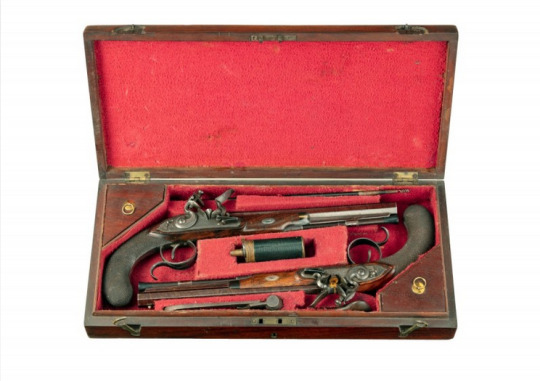
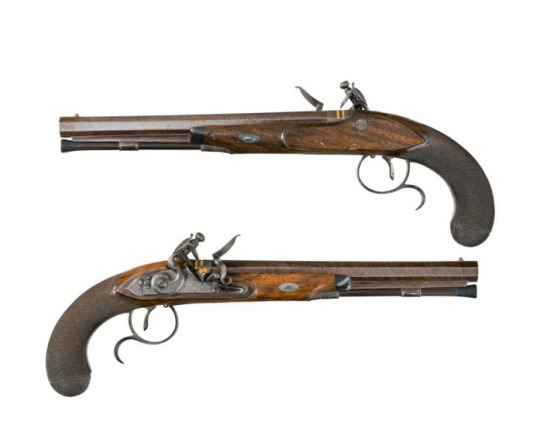
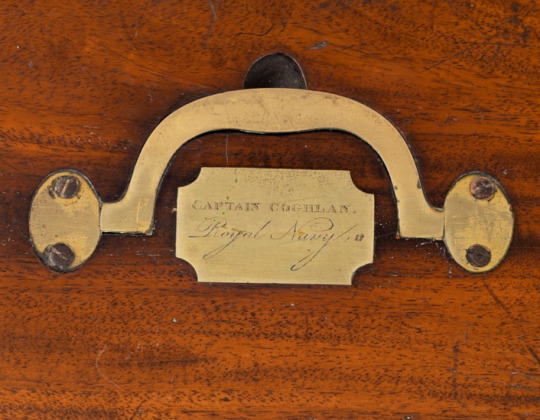
A pair of flintlock duelling pistols by Twigg of London, owned by Captain Jeremiah Coghlan (1774-1844), English, circa 1785
Captain Jeremiah Coghlan (1774-1844) was famous for his extraordinary daring in a series of naval engagements. After going to sea in the Merchant Service, Coghlan attracted the attention of Captain Pellew when he secured a line for the troopship Dutton before the ship sank off Plymouth in 1796. Like the fictional Hornblower, for whom he was the godfather in real life, Coghlan was taken on by Pellew as an ensign on the Indefatigable, where he continued to impress in a series of daring boat actions. After his rapid promotion to lieutenant, Coghlan was given command of the cutter Viper, from which he led the elimination of the Cerbère at Port Louis in Brittany against almost insurmountable odds. He surpassed this exploit when, greatly outnumbered and outgunned on both occasions, when he destroyed General Ernouf off San Domingo and captured the Diligent off Puerto Rico.
Coghlan was also successful on land, leading 200 marines in the capture of the citadel battery at Cassis in southern France in 1813, before forcing the surrender of Joachim Murat, King of Naples, in May 1815, securing the city and its treasures for the restoration of the Bourbon royal family. Having dined with Nelson in 1800, Coghlan was given the double honour of dining with Napoleon when the Emperor was taken to Elba for short-lived exile.
During his career, Coghlan received a number of presentation arms, including a 100 Guinea sword from Admiral Earl St Vincent. Given the date and nature of the weapons, it is likely that his dueling pistols were also a gift, possibly from his patron Admiral Edward Pellew, Viscount Exmouth.
#naval weapons#duelling flintlock pistols#captain jeremiah coghlan#18th century#age of sail#captain pellew
148 notes
·
View notes
Photo

#hornblower#horatio hornblower#admiral pellew#age of sail#hornblower meme#hornblower shitposting#age of sail memes#Horatio Hornblower/Edward Pellew#sorry not sorry#my shipper ass thought of this
25 notes
·
View notes
Photo

Edward Pellew, 1st Viscount Exmouth - James Northcote
27 notes
·
View notes
Text
We have finally reached the end of the first round, reducing our 128 person list to 64.
Here is the complete list of who is competing in round 2:
France:
Jean Lannes
Thérésa Tallien
Antoine Charles Louis de Lasalle
Germaine de Staël
François Joseph Lefebvre
Géraud Duroc
Étienne Jacques-Joseph-Alexandre Macdonald
Auguste François-Marie de Colbert-Chabanais
Thomas-Alexandre Dumas
Juliette Récamier
Louis-Francois Lejeune
Louis-Alexandre Berthier
Michel Ney
Joseph Fouché
Nicolas Charles Oudinot
Auguste Frédéric Louis Viesse de Marmont
Jean-Andoche Junot
Josephine de Beauharnais
Andrea Masséna
Joachim Murat
Pauline Bonaparte, Duchess of Guastalla
England:
Richard Sharpe
Tom Pullings
Benjamin Bathurst
Horatio Nelson
Barbara Childe
Robert Stewart, 2nd Marquess of Londonderry (Lord Castlereagh)
Captain Jack Aubrey
Horatio Hornblower
Admiral Edward Pellew
Arthur Wellesley, 1st Duke of Wellington
Emma, Lady Hamilton
Scotland:
Thomas Cochrane
Ireland:
Doctor Stephen Maturin
Austria:
Friedrich Bianchi, Duke of Casalanza
Klemens von Metternich
Marie Louise
Wilhelmine von Biron
Archduke Karl
Poland:
Wincenty Krasiński
Józef Zajączek
Zofia Czartoryska-Zamoyska
Józef Antoni Poniatowski
Maria Walewska
Russia:
Prince Andrei Bolkonsky
Levin August von Bennigsen
Pavel Stroganov
Barclay de Tolly
Ekaterina Pavlovna Bagration
Alexander Andreevich Durov
Karl Wilhelm von Toll
Mikhail Miloradovich
Alexander I Pavlovich
Empress Elizabeth Alexeievna
Pyotr Bagration
Prussia:
Louise von Mecklenburg-Strelitz
Frederick William III
Friederike of Mecklenburg-Strelitz
Alexander von Humboldt
Dorothea von Biron
The Netherlands:
Ida St Elme
Spain:
Juan Martín Díez
José de Palafox
Lombardy:
Alessandro Manzoni
22 notes
·
View notes
Photo
Admiral Dad always has a fabulous/handsome face😍😍😍







Admiral Dad & his fabulous face.
94 notes
·
View notes
Text
TAG DUMP #003 HORNBLOWER FANDOM
#ships full of lobsters and frogs || hornblower fandom#he who teaches tolerance through bravery || andre cotard#he who sees the world through poetry || archie kennedy#he who values life over glory || edward pellew#he who feared more than he could admire || jack hammond#he who challenges convention || horatio hornblower#she who holds the world at her feet || kitty cobham#he who begs pardon for sass || matthews#he who fights with good humor || styles#he who found faith amid dying stars || william bush
1 note
·
View note